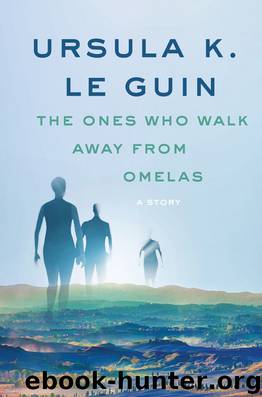The Ones Who Walk Away from Omelas by Ursula K. Le Guin

Author:Ursula K. Le Guin
Language: eng
Format: epub
Publisher: HarperCollins
Published: 2016-12-27T05:00:00+00:00
AFTERWORD
Since “The Ones Who Walk Away from Omelas” was published in 1973, no story I’ve written has been reprinted so often, or brought me so many letters. Readers ask me to tell them what the story means, or where the ones who walk away are going. Or they tell me what the ones who walk away should do instead of walking away. Some are indignant, angry, because the condition on which the happiness of everyone in Omelas depends is so cruel and so arbitrary. Why do the people of Omelas accept it? Why don’t they rescue the child in the closet?
The answer to that question is in the story: Because all the wellbeing of everyone else depends on the suffering of the child. The moment the child is rescued, everybody else will begin to suffer as hopelessly as the child does now. That’s how things are in the story. It’s the rule of this game. You can only play a game -- chess, soccer, parable -- if you follow the rules. Games and stories are imitations of life, ways of playing at life, sometimes ways of learning how to live. Some of the rules may appear both cruel and arbitrary. But if you want to play the game, or live the life, you have to follow them.
Most of the questions I get about “Omelas,” however, I can’t answer. They’re based on the assumption that the story itself is the answer to a question, and want me to explain it to them. But it isn’t an answer. It’s a question.
I didn’t think the question up. I invented this particular way of asking it, yes. But I’d found it asked by two writers I read earlier in my life. It sank deep into my mind, and came out again at last in the form of a story.
In Fyodor Dostoyevsky’s novel The Brothers Karamazov, Ivan Karamazov tells his brother the story of a little girl, horribly abused by her own mother, locked in a filthy outhouse, weeping, beating her heart with “her tiny fist in the dark and the cold.” And Ivan says:
“Imagine that you are creating a fabric of human destiny with the object of making men happy in the end, giving them peace and rest at last, but that it was essential and inevitable to torture to death only one tiny creature – that baby beating its breast with its fist, for instance -- and to found that edifice on its unavenged tears, would you consent to be the architect on those conditions?”
“No, I wouldn’t consent,” said Alyosha softly.
“And can you admit the idea that the men for whom you are building it would agree to accept their happiness on the foundation of the unexpiated blood of a little victim? And accepting it, would remain happy?”
“No,” said Alyosha.
Download
This site does not store any files on its server. We only index and link to content provided by other sites. Please contact the content providers to delete copyright contents if any and email us, we'll remove relevant links or contents immediately.
| Fantasy | Gaming |
| Science Fiction | Writing |
Sita - Warrior of Mithila (Book 2 of the Ram Chandra Series) by Amish(54858)
The Crystal Crypt by Dick Philip K(36856)
Cat's cradle by Kurt Vonnegut(15333)
Always and Forever, Lara Jean by Jenny Han(14899)
Ready Player One by Cline Ernest(14639)
The Last by Hanna Jameson(10246)
Year One by Nora Roberts(9783)
Persepolis Rising by James S. A. Corey(9348)
The remains of the day by Kazuo Ishiguro(8969)
Never let me go by Kazuo Ishiguro(8877)
Red Rising by Pierce Brown(8759)
Dark Space: The Second Trilogy (Books 4-6) (Dark Space Trilogies Book 2) by Jasper T. Scott(8169)
The handmaid's tale by Margaret Atwood(7755)
The Circle by Dave Eggers(7104)
Frank Herbert's Dune Saga Collection: Books 1 - 6 by Frank Herbert(7059)
The Testaments by Margaret Atwood(6880)
Legacy by Ellery Kane(6649)
Pandemic (The Extinction Files Book 1) by A.G. Riddle(6529)
Six Wakes by Mur Lafferty(6239)
